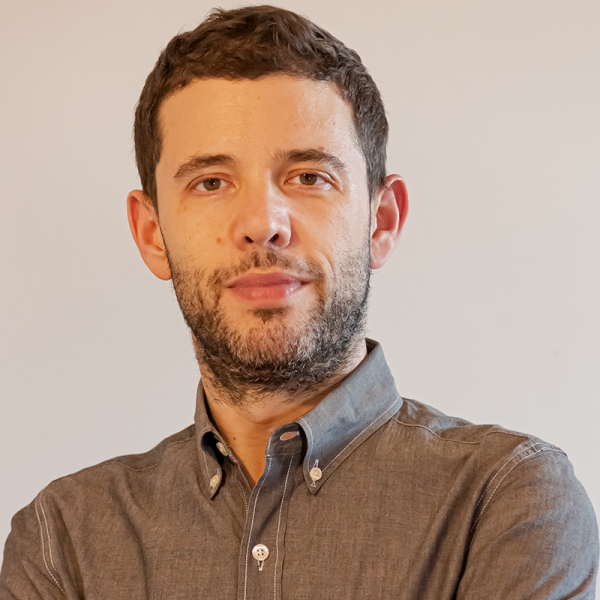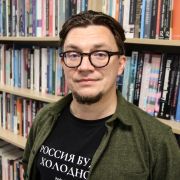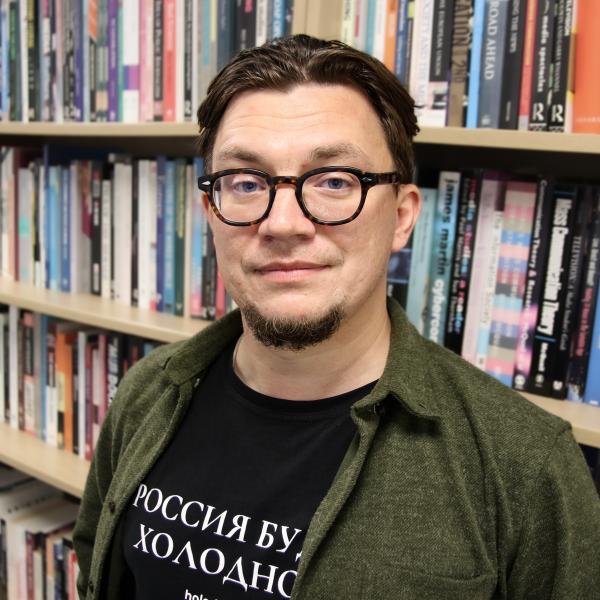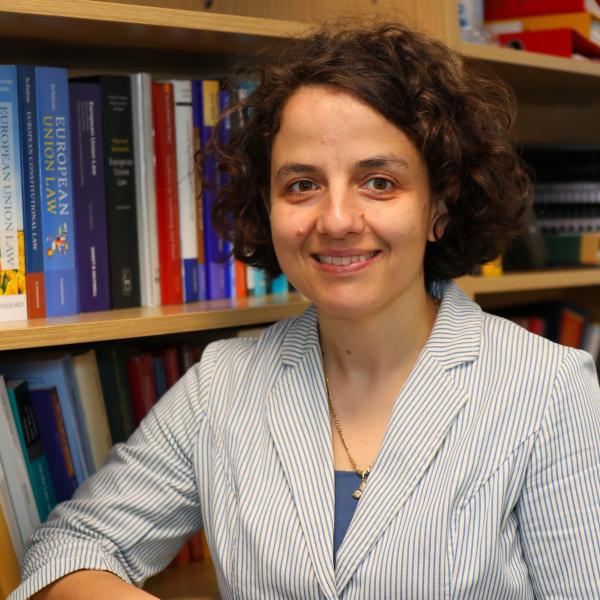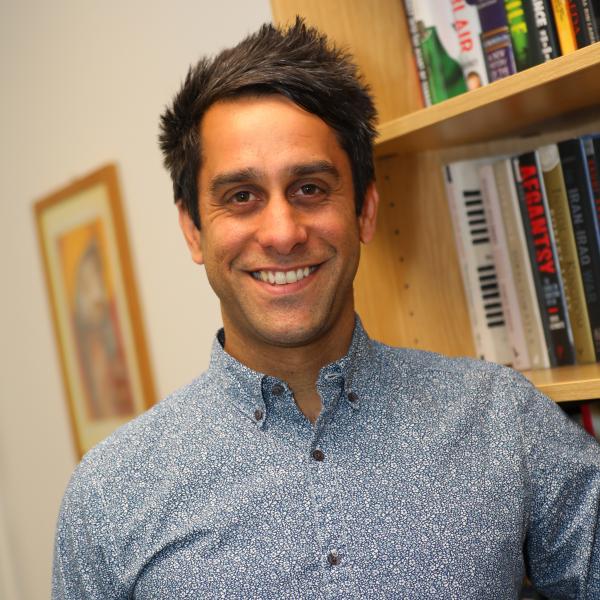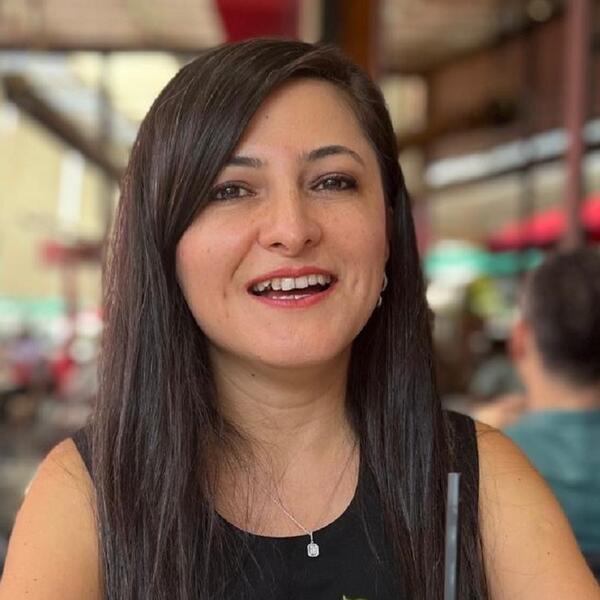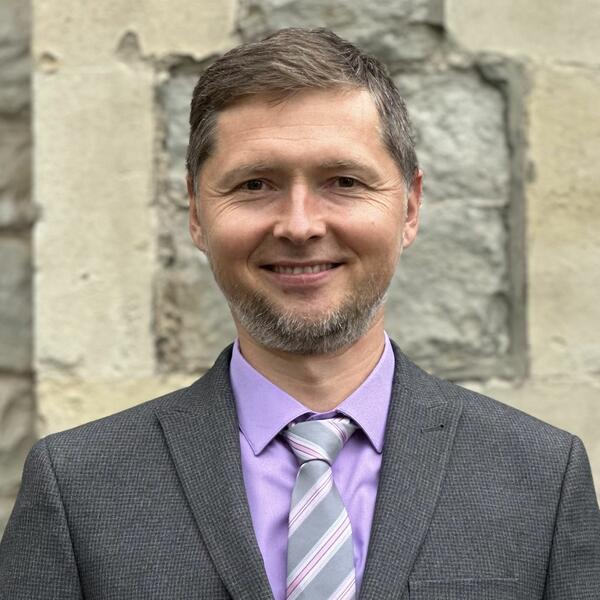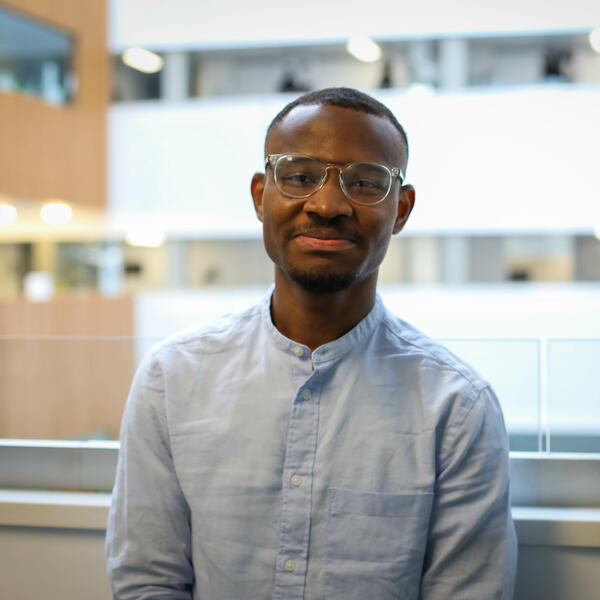Members
Read more about the members of the Disinformation Research Cluster.
- Dani Madrid-Morales (research cluster co-lead)
-
Dani studies global political communication, with a focus on the impact of new digital technologies in the production of State-sponsored news, global public opinion, and misinformation in the Global South. He has published extensively on Africa-China relations through the mass media, particularly on the reception of Chinese media content in Kenya and South Africa. His latest book is Disinformation in the Global South (Wiley), co-edited with Herman Wasserman. Dani works as a Lecturer at the Department of Journalism Studies, The University of Sheffield. Prior to this, he was an Assistant Professor at the Valenti School of Communication, University of Houston, and a Hong Kong PhD Fellow, at City University of Hong Kong.
Relevant publications:
- Madrid-Morales, D., Wasserman, H., & Ahmed, S. (2024). The geopolitics of disinformation: Worldviews, media consumption and the adoption of global strategic disinformation narratives. International Journal of Public Opinion Research. https://doi.org/10.1093/ijpor/edad042
- Matanji, F., Tully, M., Mudavadi, K. C., Diop, L., & Madrid-Morales, D. (2024). Media Literacy and Fact-checking as Proactive and Reactive Responses to Misinformation in Kenya and Senegal. African Journalism Studies, 1–18. https://doi.org/10.1080/23743670.2024.2401782
- Mudavadi, K. C., Matanji, F., Diop, L., Tully, M., & Madrid-Morales, D. (2024). Stakeholder perceptions of regulatory responses to misinformation in Kenya and Senegal. Journalism, 14648849241255935. https://doi.org/10.1177/14648849241255935
- Wasserman, H., & Madrid-Morales, D. (2024). What Motivated the Sharing of Disinformation about China and COVID-19? In G. Yang, B. Meng, & E. J. Yuan (Eds.), Pandemic Crossings: Digital Technology, Everyday Experience, and Governance in the COVID-19 Crisis (pp. 189–212). Michigan State University Press.
- Wasserman, H., & Madrid-Morales, D. (Eds.). (2022). Disinformation in the Global South. Wiley.
- Ahmed, S., Madrid-Morales, D., & Tully, M. (2023). Online Political Engagement, Cognitive Skills, and Engagement with Misinformation: Evidence from Sub-Saharan Africa and the United States. Online Information Review, 47(5), 989–1008. https://doi.org/10.1108/OIR-11-2021-0634
- Ahmed, S., Madrid-Morales, D., & Tully, M. (2022). Social media, misinformation, and age inequality in online political engagement. Journal of Information Technology & Politics, 20(3). https://doi.org/10.1080/19331681.2022.2096743
- Madrid-Morales, D., & Wasserman, H. (2022). An Assessment of Media Literacy and Fact-Checking Training Needs in South African Schools and Universities. Africa Check.
- Madrid-Morales, D., Wasserman, H., Gondwe, G., Ndlovu, K., Sikanku, E., Tully, M., Umejei, E., & Uzuegbunam, C. E. (2021). Motivations for Sharing Misinformation: A Comparative Study in Six Sub-Saharan African Countries. International Journal of Communication, 15, 1200–1219.
- Tully, M., Madrid-Morales, D., Wasserman, H., Gondwe, G., & Ireri, K. (2021). Who is Responsible for Stopping the Spread of Misinformation? Examining Audience Perceptions of Responsibilities and Responses in Six Sub-Saharan African Countries. Digital Journalism, 10(5). https://doi.org/10.1080/21670811.2021.1965491
- Wasserman, H., & Madrid-Morales, D. (2019). An Exploratory Study of “Fake News” and Media Trust in Kenya, Nigeria and South Africa. African Journalism Studies, 40(1), 107–123. https://doi.org/10.1080/23743670.2019.1627230
- Ilya Yablokov (research cluster co-lead)
-
Ilya’s prime topic of study is Russian state-sponsored disinformation and, in particular, conspiracy theories. He published extensively on the history of Russian anti-Western propaganda and ideology and, more recently, focused on the production part of Russia’s state disinformation. Previously, Ilya looked at the state-run news agency Russia Today and the roles that public intellectuals loyal to the Kremlin played in shaping ideological and media landscapes. Ilya is now working on several projects, including the study of how grassroots anti-vaxx communities used conspiracy theories to resist the Kremlin’s vaccination policies in 2021-2022 and the monograph on the history of Russian media and the role that some media professionals played in reinforcing Vladimir Putin’s authoritarianism. I am interested in how disinformation is used by authoritarian regimes as well as in the ways how media professionals develop and distribute disinformation via traditional and digital media.
Relevant publications:
- Yablokov I, Solovyeva O (2022) ICT in Putin’s Russia. In Gill G (ed) Routledge Handbook of Russian Politics and Society. London: Routledge, pp. 364-376
- Yablokov I and Chatterjee-Doody P (2021). Russia Today and Conspiracy Theories: People, Power, Politics on RT. London: Routledge.
- Yablokov I, Avramov K and Gatov V (2020) Fake News and Conspiracy Theories. In Knight P and Butter M (eds) Routledge Handbook of Conspiracy Theories. London: Routledge, pp. 581-595.
- Yablokov I (2020). How Russia entered the ‘New World Order’: Exploring the Post-Soviet Context of the Concept. In: Knight P and Butter M (eds) Routledge Handbook of Conspiracy Theories. London: Routledge, pp. 511-524.
- Yablokov I (2019). Anti-Jewish Conspiracy Theories in Putin’s Russia. Antisemitism Studies, 3 (2), pp. 291-316. Yablokov I (2018) Conspiracy Theories in post-Soviet Russia. In: Uscinski J (ed) Conspiracy Theories and the People Who Believe Them. New York-London: Oxford University Press, pp. 360-371.
- Yablokov I (2018). Fortress Russia: Conspiracy Theories in the Post-Soviet World. Cambridge: Polity. Etkind A and Yablokov I (2018). Global crises as Western conspiracies: Russian theories of oil prices and the ruble exchange rate. Journal of Soviet and Post-Soviet Politics and Society 3 (2), pp. 47-85.
- Yablokov I (2017). Social networks of death: conspiracy panics and professional journalistic ethics in the post-Soviet Russia. Quaderni 94, pp. 53-62.
- Yablokov I (2015). Conspiracy theories as Russia’s public diplomacy tool: The case of ‘Russia Today (RT). Politics 35 (3-4), pp. 301-315. Yablokov I (2014). Pussy Riot as agent provocateur: conspiracy theories and the media construction of nation in Putin’s Russia. Nationalities Papers 42 (4), pp. 622-636.
- Yablokov I, Solovyeva O (2022) ICT in Putin’s Russia. In Gill G (ed) Routledge Handbook of Russian Politics and Society. London: Routledge, pp. 364-376
- Irini Katsirea
-
Irini Katsirea studied at the Free University of Berlin, at the University of Leicester (LLM) and at Magdalene College, Cambridge (PhD). She is Reader in International Media Law at the University of Sheffield (UoS). Her research interests are in the areas of International and Comparative Media Law and Policy. She is an Expert Fellow of the EPSRC Sprite + network. She is the author of Press Freedom and Regulation in a Digital Era (OUP, forthcoming), Public Broadcasting and European Law. A Comparative Examination of Public Service Obligations in Six Member States (Boston, Kluwer, 2008) and of Cultural Diversity and European Integration in Conflict and in Harmony (Athens, Ant. N. Sakkoulas, 2001). She is interested in the extent to which the regulation of mis-/disinformation is compatible with guarantees of freedom of expression. She is the author of ‘“Fake news”: reconsidering the value of untruthful expression in the face of regulatory uncertainty’ (2019) 11 (1) Journal of Media Law 159-188 and has co-authored a report on ‘The fight against disinformation and the right to free speech’ (European Parliament, LIBE Committee, July 2021) (together with O. Batura, J. Bayer, B. Holznagel, K. Lubianiec and S. C.Hartmann).
Relevant publications:
- ‘The fight against disinformation and the right to free speech’ (European Parliament, LIBE Committee, July 2021) (together with O. Batura, J. Bayer, B. Holznagel, K. Lubianiec and S. C.Hartmann) ‘“Fake news”: reconsidering the value of untruthful expression in the face of regulatory uncertainty’ (2019) 11 (1) Journal of Media Law 159-188
- ‘Fake News und Meinungsfreiheit: Der Fall Großbritannien’ in B. Holznagel, W. Steull (eds), Öffentlich-rechtlicher Rundfunk in Zeiten des Populimus (Leipzig, Vistas, 2018), 114-132
- Sheffield Political Economy Research Institute, ‘Covid-19, “fake news” and the future of platform regulation’ Parts 1 and 2 http://speri.dept.shef.ac.uk/category/blog/, February 2021
- Information Law and Policy Centre spotlight on ‘fake news’ and Covid-19https://infolawcentre.blogs.sas.ac.uk/2020/07/31/in-conversation-with-irini-katsirea-reader-in-international-media-law-university-of-sheffield/, July 2020
- ‘The fight against disinformation and the right to free speech’ (European Parliament, LIBE Committee, July 2021) (together with O. Batura, J. Bayer, B. Holznagel, K. Lubianiec and S. C.Hartmann) ‘“Fake news”: reconsidering the value of untruthful expression in the face of regulatory uncertainty’ (2019) 11 (1) Journal of Media Law 159-188
- Jared Ahmad
-
Jared’s research focuses on the construction and representation of terror threats. His most recent book is The BBC, the War on Terror and the Discursive Construction of Terrorism: Representing ‘Al-Qaeda’ (2018), and he has also published in international journals such as Critical Studies on Terrorism, Media, War and Conflict and International Journal of Communication. Jared’s current work focuses on the communicative interactions that take place between different actors involved in terrorism-related disinformation cycles: From terrorists’ attempts to use propaganda to amplify fear and insecurity in the aftermath of an attack to the way politicians and far-right organisations use those very same (self)representations to legitimise their own responses to such threats.
Relevant publications:
- “'Islam is the Religion of the Sword not Pacifism Strategic': Self-Othering and Strategic Nostalgia in Islamic State Propaganda”, in Holly Furneaux & Matilda Grieg (eds.), Enemy Encounters in Modern Warfare. Palgrave-Macmillan (2023).
- “Picturing the ‘Hordes of Hated Barbarians’: Islamic State Propaganda, (Self)Orientalism and Strategic Self-Othering”, International Journal of Communication, Vol 16 (2022), pp. 2935-2957.
- “Constructing the Islamic State: Analysing the Interplay between Media and Policy Framing of the Islamic State in the Aftermath of the November 13th 2015 Paris Attacks”, Critical Studies on Terrorism, Vol. 13, No. 4 (2020), pp. 568-590.
- “Serving the Same Interests: The Wood Green Ricin Plot, Media-State-Terror Relations and the Contemporary ‘Terrorism’ Dispositif”, Media, War and Conflict, Vol. 12, No. 9 (2019), pp. 411-434.
- Gulbin Aysi Ates
-
Gulbin Aysi Ates is postdoc researcher in Disinformation Research Cluster. She received undergraduate degree in psychology at Middle East Technical University, she completed her graduate studies in political science and public administration at Middle East Technical University. Her master’s thesis entitled “Representing Centre-Right or Conservative Right? The Case of The Democratic Party in Turkey, 1970-1980”. The thesis examined an overlooked party in Turkish politics and is critical to compare the periods within the Turkish political history. She has a Ph.D. degree in political science at Ankara University. The dissertation was based on an interdisciplinary approach of psychology and political science, named as “An Interdisciplinary Perspective on Conspiracy Theories from the Fields of Political Ideology and Political Psychology: The Case of Sebilürreşad Journal”. In addition to her academic work, Dr. Ateş has been working as a Supreme Council Expert at the Radio and Television Supreme Council in Turkey. She completed the expertise thesis titled as "Evaluation of National and International Legal Regulations Regarding Children in the Field of Communication" titled thesis as an expertise thesis at the Radio and Television Supreme Council of Turkey. She also supervised an expertise thesis named as "Content Analysis of Television Children's Programmes: Examples of TRT Çocuk and Cartoon Network TV Channels” at the Radio and Television Supreme Council of Turkey. Her research interests are conspiracy theories, antisemitism and disinformation. Her recent publication is “Türk Siyasetinde 1980 Darbesi ve Otoriter Siyasetin Tezahürü”, RESS Journal Route Educational & Social Science Journal, 10 (1), 203-218, Doi:http://dx.doi.org/10.17121/ressjournal.3320. She is currently working on research topics on antisemitic conspiracy theories since October 7, 2023 on Turkish television channels and on disinformation about climate change.
- Maksym Balaklytskyi
-
PhD (Doctor of Sciences) in Social Communications
Research interests: disinformation, propaganda, Russo-Ukrainian war, refugees, migration, European Union
Maksym Balaklytskyi holds a PhD in Ukrainian Literature (2003) and is a Doctor of Sciences in Social Communications (2014) received from Taras Shevchenko National University of Kyiv, Ukraine. He had internships in the UK (Cambridge University), Germany, and Poland. He started his career in media as a production team member of a news and opinion TV weekly, he made video reports from the Ukrainian Parliament and served as a News Editor at the Hope Media Group, Ukraine. In 2004-2022 Maksym worked as a Professor of the Journalism Department at V.N.Karazin Kharkiv National University, the leading university in Ukraine. He also was a visiting lecturer at Jan Dlugosz University in Czestochowa, Poland. He is a member of editorial boards of three academic journals in Ukraine – The Journal of V.N. Karazin Kharkiv National University. Series: Social Communications; Bulletin of Lviv Polytechnic National University: Journalism; Ukrainian Information Space.
Selected publications.
Україна. Війна. Бог [Ukraine. War. God (Collection of testimonies of Ukrainian Christians experiencing the Russo-Ukrainian War)]. Editor, preface author, contributor–M.Balaklytskyi. Kyiv: Lifesource Christian Publishing, 2023; 2nd ed, 2024.
Balaklytskyi, M. Hope Channel Ukraine as "the Spiritual Front": Mediatization of Religion in the War Against Ukraine, Occasional Papers on Religion in Eastern Europe: 2023. Vol. 43 : Iss. 7 , Article 10. 111-128. DOI: https://doi.org/10.55221/2693-2148.2458
Kuryliak, V. and Balaklytskyi, M. Armed Conflict and Protestant Volunteering in Eastern Ukraine, Occasional Papers on Religion in Eastern Europe: 2021. Vol. 41 : Iss. 4 , Article 20. 268-287.
Balaklytskyi, M., Kuryliak, V. Psychological analysis of military journalist's professional activity. Brazilian Journalism Research. 2020. Vol. 16, No 1, 184-207. DOI: 10.25200/BJR.v16n1.2020.1213
Maksym holds a two year scholarship for doing research on possible susceptibility of Ukrainian refugees in the EU toward Russian disinformation.
Since the Russo-Ukrainian war began in 2022, over four million Ukrainians have fled to the European Union, benefiting from the Temporary Protection Directive. Many refugees from southeastern Ukraine, where Russian language and media were common, hold diverse views on Russian culture. Russia, positioning itself as a defender against Western influence, uses disinformation to discredit these refugees and destabilize Europe. This study analyzes Russian propaganda narratives, particularly those targeting Ukrainian refugees, to identify how they exploit political vulnerabilities. The goal is to help the EU counter Russian disinformation and prevent further division within its borders.
***
Maksym Balaklytskyi. Talk at the University of Sheffield (01/05/2024) ‘Perception of the West amongst Ukrainian refugees in the EU: preliminary observations’.
- Vincent Obia
-
Vincent’s research interests include AI and new media regulation in Africa. He has worked in areas such as social media cultures, media literacy, and how regulation intersects with concerns related to disinformation, hate speech, and online harms more broadly. His work also centres around the differences between the Global North and South in the design, use, and regulation of new media technologies.
Vincent has been awarded a Leverhulme Early Career Fellowship for his project titled, ‘A continent on the margins: Investing African approaches to regulation AI.’ Using Mauritius, Egypt, and Rwanda as case studies, the project critically interrogates existing debates which tend to see AI regulatory frameworks in Africa as peripheral, while Global North perspectives are universalised. It examines African views and strategies on AI governance to provide fresh insights, reshape our understanding, and challenge dominant Euro-American narratives. Using a mixed-method inquiry, it aims to carry out an in-depth analysis of African ideas around AI, and how they (re)shape and advance our understanding of prospects for effective global AI governance.
Seen in the broader context, the project aims to develop a conceptual framework that underscores what is distinctive about African approaches to regulating AI and encompasses the specific concerns of Mauritian, Egyptian, and Rwandan stakeholders, with the potential for generalisability to other countries on the continent. It also seeks to introduce the ‘politics of locationality’ as a new concept tied to postcolonial and decolonial thoughts and how they interrogate the power asymmetry that African countries face in attempting to regulate AI systems. The politics of locationality points to and is expected to reveal how the power resident in Big Tech platforms and AI systems is associated with their physical situatedness, and how this underlying reality is, in turn, producing new imbalances (such as in the control of the technology), and unequal opportunities for AI development and regulation faced by countries in Africa. It further aims to produce original insights based on ideas and approaches co-created by African stakeholders to yield alternative solutions to AI regulatory challenges and contribute toward extending global debates on AI regulation.
For his PhD, Vincent worked on a research project titled, ‘Regulatory Annexation and the Matrix of Dependence,’ fully supported by a Commonwealth Scholarship Award. The study considered social media regulation in Nigeria and the wider African context, including Egypt, Uganda, Tanzania, and Kenya. Vincent is currently co-editing a book collection titled ‘Regulating New Media in Africa’ to be published by Intellect and the University of Chicago Press. He is also part of an international Research Panel on Artificial Intelligence led by the Observatory for Information and Democracy.
Publications
Obia, V (2023) Regulatory annexation: Extending broadcast media regulation to social media and internet content. Communication Law and Policy, 28(2), 99-123.
Obia, V (2023) Twitter activism: Understanding the Twittershpere as the foremost community for activism and dragging in Nigeria. New Media & Society, 0(0), 1-17.
Edwards L, Obia V, Goodman E and Spasenoska S (2023) Cross-Sectoral Challenges to Media Literacy. Department for Science, Innovation and Technology.
Obia V, Ibraheem I and Onwunali C (2022) Borrowing lenses from the West: An analysis of African media representation of Western nations. Journal of African Media Studies, 14(3), 385-401.
Obia V (2022) The costs of connection: How data is colonizing human life and appropriating it for capitalism (Review of book by Nick Couldry and Ulises Mejias). Information, Communication & Society, 26(9), 1908-1910.
Marsden S, Rogers J, Ryder M and Obia V (2022) Beyond Black to Front: Assessing Channel 4’s Black to Front Initiative and New Diversity and Inclusion Challenges. Sir Lenny Henry Centre for Media Diversity.
Obia V (2021) Are social media users publishers? Alternative regulation of social media in selected African countries. Makings, 2(1), 1-13.
Amobi I, Sunday O and Obia V (2020) Parental mediation of mobile and social media engagement of teens in Lagos State, Nigeria. SAU Journal of Management and Social Sciences, 5(2), 19-35.
Sunday O, Yusuff A, Simon G, Obia V and Ejiwunmi S (2018) Use of indigenous languages for social media communication: The Nigerian experience. In A. Salawu (Ed), African Language, Digital Media and Communication, Routledge (pp. 139-153).


